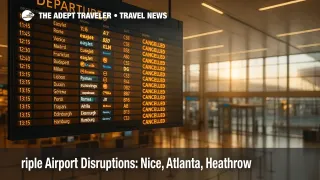Triple Airport Disruptions: Nice, Atlanta, Heathrow

A fresh wave of airport disruptions is rippling across three continents as a French air-traffic-control strike, U.S. thunderstorms, and a British radar failure converge. Nice Côte d'Azur Airport (NCE) is cancelling scores of low-cost departures, Hartsfield-Jackson Atlanta International Airport (ATL) is battling renewed storm cells after a weekend of heavy delays, and London Heathrow Airport (LHR) is still clearing a backlog after Sunday's switch to backup ATC hardware. Travelers with tight connections through any of the hubs over the next 48 hours should build in extra margin or consider rerouting.
Key Points
- Why it matters: Three simultaneous trouble spots magnify the risk of missed connections.
- Travel impact: More than 400 flights already cancelled, hundreds more delayed, with EasyJet, Wizz, and Delta hardest hit.
- What's next: Storm cells linger over Atlanta through Monday night; French unions meet Tuesday; Heathrow backlog may persist into early Tuesday.
Snapshot
Nice's day-long ATC walkout has wiped out roughly half of Monday's EasyJet and Wizz Air schedules, forcing the carriers to re-book or refund passengers. In Atlanta, FlightAware logged 238 delays and 70 cancellations on Saturday alone, and the National Weather Service warns that slow-moving thunderstorm clusters could redevelop by late afternoon Monday. Heathrow's Sunday radar glitch, resolved only after NATS engineers shifted traffic to backup servers, cancelled 122 flights and delayed at least 100 more, according to airport data. Each incident on its own strains regional capacity; together they threaten to cascade across trans-Atlantic and intra-European networks.
Background
French controllers have staged rolling strikes since early July to protest staffing rules and pension reforms, with low-cost airlines bearing the brunt because of their dense point-to-point schedules. Nice Côte d'Azur, France's third-busiest airport, handles about 14 million passengers a year and relies heavily on summer leisure demand. In the United States, ATL is the world's busiest airport by passenger volume; convective weather routinely triggers ground holds that ripple across Delta's hub-and-spoke network. Heathrow is Europe's largest international gateway. Its July 30, 2023 system outage exposed vulnerabilities in NATS' Swanwick control center; Sunday's repeat, while shorter, rekindled criticism from airlines and passenger groups.
Latest Developments
Nice strike deepens summer flight cancellations
Unions UNSA-ICNA and USAC-CGT confirmed the walkout would last until 10 p.m. local time Monday. EasyJet has already cut more than 60 departures, while Wizz Air scrubbed at least 18, according to airport notices. Ryanair diverted several Marseille flights to Montpellier to avoid controlled French airspace. Travelers can check real-time status at the airport's operations page here.
Atlanta storms stall Delta's recovery
By 1 p.m. Saturday, FlightAware showed 238 delays and 70 cancellations at ATL, with Delta accounting for roughly two-thirds. The National Weather Service forecasts renewed slow-moving cells from 4 p.m. to midnight Monday, raising the prospect of additional ground-stops. Delta's weather-waiver page lists fee-free changes for travel through August 5 here.
Heathrow clears radar-glitch backlog
NATS said a "radar-related fault" forced a temporary traffic cap before engineers moved operations to standby servers. Heathrow cancelled 122 flights and delayed more than 100. While normal throughput resumed by late afternoon, airline schedules remain skewed, and crew resets could spill cancelations into early Tuesday. Passengers should reconfirm departure terminals and security-wait forecasts here.
Analysis
The confluence of a national labor dispute, meteorological volatility, and technical fragility illustrates how fragile global air connectivity remains. Each hub serves as a critical node: Nice for Mediterranean leisure flows, Atlanta for U.S. domestic and Latin America connections, Heathrow for long-haul trans-Atlantic traffic. When disruptions overlap, airline network planners struggle to reposition crews and aircraft fast enough, amplifying knock-on effects. Low-cost carriers at Nice lack spare capacity; Delta at Atlanta must juggle hub banks around storm-driven ground holds; Heathrow's slot-constrained environment leaves little slack once departures back up. Although each event is localized, their combined footprint tests IATA's Worldwide Airport Slot Guidelines and Eurocontrol traffic-flow programs. Notably, Sunday's Heathrow glitch revived calls for NATS to accelerate its NextGen modernization. For travelers, the takeaway is straightforward: hold longer minimum-connection times, enable airline app notifications, and budget at least one back-up routing option when itineraries intersect multiple high-pressure hubs in summer.
Final Thoughts
With airport disruptions spreading across France, the United States, and the United Kingdom, vigilance becomes the best insurance. Add buffer time, watch airline alerts, and, if possible, route around Nice, Atlanta, or Heathrow until mid-week when operations stabilize. Staying flexible today could save a missed holiday tomorrow, especially when flight cancellations and travel delays stack up faster than airlines can recover from overlapping crises.
